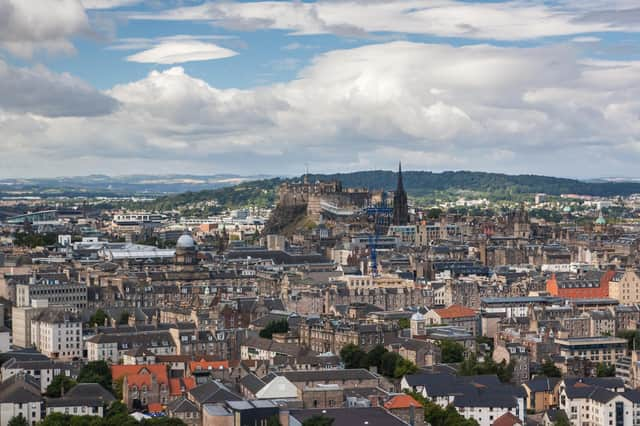Children going to bed hungry only a mile from where Gucci plans to open a flagship store - Susan Dalgety


It’s a city awash with history, where people clamber to live in centuries-old tenements and tourists gasp in wonder at the ancient castle at its heart. It is also alive with the possibilities of a brave new world. Edinburgh’s Bioquarter delivers health advances that will save lives as yet unborn and the Edinburgh Futures Institute was set up to help solve the complex problems of today, grappling with social issues that need “deep and novel ways of thinking”.
Edinburgh is also a divided city. One where 15,000 children live in households below the poverty line and where men born in the city’s most marginalised areas live for 12 years less than those in the most affluent neighbourhood. Statistics released this week show that Edinburgh’s drug deaths have hit an all-time high. One hundred and thirteen Edinburgh citizens died of accidental overdoses last year, and drug fatalities have almost doubled in the last decade.
Advertisement
Hide AdAdvertisement
Hide AdAll great cities are socially and economically divided, Richard Holloway told a gathering in Edinburgh’s City Chambers last night. He was speaking at an event to mark the 20th anniversary of the One City Trust – a charity set up in 2003 in response to the 1998 Lord Provost’s Commission on Social Inclusion.
One of Scotland’s greatest thinkers of recent years, the former Bishop of Edinburgh told the audience that one way to read human history is to see it “as a struggle by those at the bottom to join those at the top, a struggle by the excluded to find a place at the table”.
I have a confession to make. I was invited to join Richard Holloway at the event, but last night I was heading to France in my camper van to try and catch the last of the summer sun before the darkness of winter sets in. I was sorely disappointed I couldn’t attend, because 25 years ago, as a young councillor and chair of Edinburgh’s Urban Regeneration Committee, I convinced the then Lord Provost, Eric Milligan, to set up a commission into why our great city remained so divided. He didn’t take much persuading. Milligan is perhaps better known for his tartan trews and his unique speaking style, but he was, and remains, a committed socialist.
I sat on the commission for a short time, but by the time its report was published, I had swapped politics for journalism – a switch I have made several times in my life – so I can take no credit for its achievements, which as well as the One City Trust included a programme to provide training for the city’s major employment sectors, such as retail and tourism, and additional funding for extra teaching hours in primary and secondary schools.
In 2002, it looked as if Edinburgh could truly become a united city, one where a child could flourish whether they grew up in Wester Hailes, where I had raised my two sons, or South Morningside, where I now live. The economy was booming, with the entrenched unemployment of the 1980s fast becoming a folk memory; the democratic renewal of devolution meant that Scotland – and its capital city – could create its own solutions to long standing health challenges, such as deaths from smoking, and with a New Labour government in power at Westminster, it truly felt a new dawn had broken.
Two decades on, and it sometimes feels as if nothing has changed since the 1980s and the city’s ‘Trainspotting’ years, when unemployment was 20 per cent and higher in neighbourhoods like Craigmillar and Pilton and cheap heroin flooded the damp-ridden high-rise blocks on the edge of our city.
Our city is as divided as ever. A succession of economic shocks, starting with the great crash of 2007/08, which nearly saw the Royal Bank of Scotland collapse and our economy with it, and ending with a global pandemic and a cost-of-living crisis, has entrenched poverty in our poorest neighbourhoods.
Fewer people may now be classed as unemployed than in 1984, but a low-wage, insecure job market means that 14,000 working people in Edinburgh rely on Universal Credit to survive. The queues outside the city’s food banks grow longer every week, with children going to bed hungry only a mile from where Gucci plans to open a flagship store. In a city where nearly a quarter of children attend private schools – the highest proportion in the UK – a child’s postcode, not her ability, still decides her future. And buying, or even renting, a home is out of reach for most people under 30, unless their parents – or grandparents – are well off and exceedingly generous.
Advertisement
Hide AdAdvertisement
Hide AdPolitics – once seen as the way to create a better society – has become mired in arguments about national and personal identity rather than a grown-up debate about how to achieve an equitable economy. Edinburgh City Council, which once helped drive the city’s growth, has seen its budgets slashed to the bone, with another £70 million of cuts looming over the next three years. As ever, it will be those with the least who will suffer the impact the most.
As the 2023 festival season enjoyed a last burst of exuberance in the Royal Mile last night, a few metres away Richard Holloway ended his speech with an exhortation for Edinburgh citizens to bring something of the festival’s “enthusiasm and excitement to tackling the problems that confront us.”
“We want to celebrate our city, but we would like to make it possible for everyone to get into the party, so it can become truly One City.” I share his ambition. I only wish I could, once again, believe it was achievable.
Comments
Want to join the conversation? Please or to comment on this article.